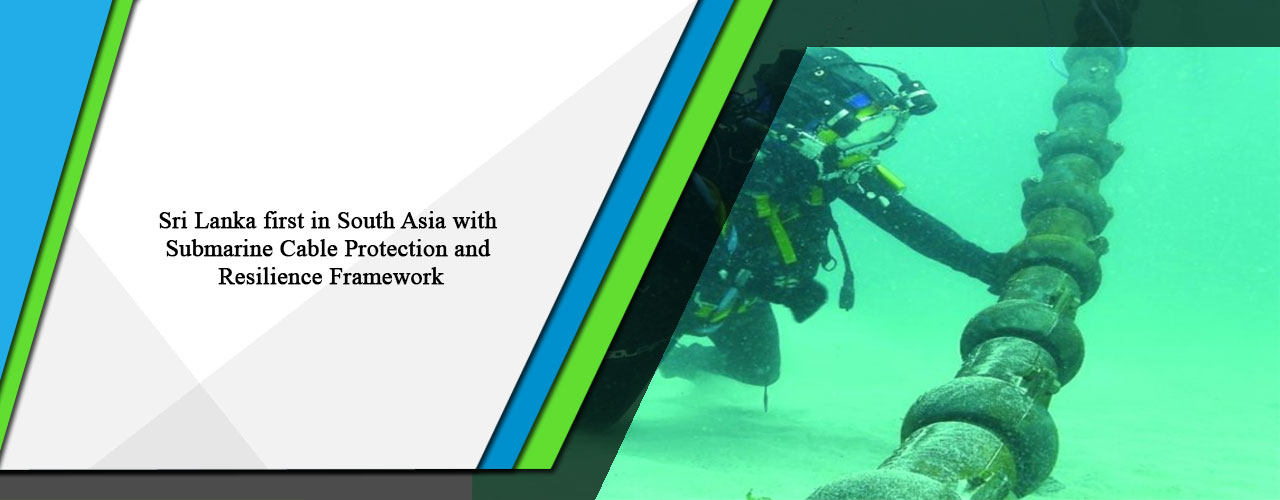Sri Lanka first in South Asia with Submarine Cable Protection and Resilience Framework
Sri Lanka has reportedly launched the Submarine Cable Protection and Resilience Framework at a stakeholder meeting chaired by Secretary to Sri Lanka’s President Dr. P.B. Jayasundera.
Sri Lanka is the first country in Asia to come up with such a framework, and this was possible with the generous support of the Japanese Government through the United Nations Office on Drugs and Crime (UNODC) Global Maritime Crimes Program (GMCP), according to local media reports.
In this new age of lockdowns, remote working and virtual conferences, our reliance on global digital communications has grown dramatically, yet most people incorrectly assume that satellites are responsible for sending data when in reality, more than 99% of all international digital data and communications are transferred via a network of more than 400 cables, which span a distance of more than 1.8 million km across the world’s oceans, a report in the Daily FT stated.
The International Cable Protection Committee (ICPC) has reportedly estimated that internet traffic has increased between 25% and 50% between November 2019 and the early stages of lockdown in April 2020, and this will likely continue as we adapt to the ‘new normal’.
Zoom Video Communications revenue for the quarter ending on 31 July 2020 has seen a 355% increase compared to the previous year, which indicates the increased video conferencing occurring as a result of widespread remote work, remote education, and remote personal video communications.
Given the reliance on this global network, it is critical that it remains as resilient as possible.
Sri Lanka’s Foreign Secretary Admiral Prof. Jayanath Colombage has reportedly stated that Sri Lanka has been working with international partners such as UNODC’s Global Maritime Crime Program (GMCP) and the International Cable Protection Committee (ICPC) in order to develop a National Plan on Submarine Cables, to provide protection and resilience for Sri Lanka, having understood the threats and responsibilities of having several cables running through its jurisdiction.
UNODC GMCP Programme Coordinator Kaitlin Meredith has been quoted as saying that the UN General Assembly Resolution (A/RES/73/124, 31 December 2018), which highlights the responsibility of states, whose economies and societies are served by these cables, to contribute to the protection of cables, under international law.
She has further said, “UNODC values the continued leadership of Sri Lanka in the development of its national framework, as well as in the sphere of maritime security more broadly” and that “UNODC is looking forward to the continued partnership with Sri Lanka as we can begin to export some of the good practices and lessons learned to the region”.
In Sri Lanka, developing of the framework was undertaken jointly by the Telecommunication Regulatory Commission of Sri Lanka (TRCSL) and the Ocean Affairs, Environment and Climate Change Division of the Foreign Ministry with the technical assistance of ICPC and UNODC-GMCP, the news report noted, adding that the process began in September 2020, with stakeholder engagement and was followed by a series of virtual consultations.
The framework encompasses international best practices recommended by ICPC.
At the launch of the framework, Minister and Japanese Embassy in Colombo Deputy Head of Mission Kitamura Toshihiro has been quoted as saying, “the National Framework would certainly consolidate Sri Lanka’s aspirations to develop into a Commercial and Financial Hub, as well as a Global Innovation Hub, as envisaged in the ‘Vistas of Prosperity and Splendour’”.
It has also been noted that this initiative “in close partnership with UNODC-GMCP, to develop the National Framework, would not only be seen as a major breakthrough for Sri Lanka but also for the whole region, to stand as a shining beacon in the Indian Ocean”.
Meanwhile, TRCSL Director-General Oshada Senanayake has reportedly noted the importance of ensuring a robust and resilient submarine cables ecosystem in Sri Lanka in line with the UNGA resolution, on the need for nations to take proactive measures to secure fibre-optic submarine cables.
He has added that “the initiative will now provide for the implementation of a progressive national submarine cables protection and resilience framework to further strengthen Sri Lanka’s vision of digital transformation, as well as positioning Sri Lanka as a hub for technology services and innovation”.
OSL take:
The government of Sri Lanka is focused on developing and uplifting the country’s ICT and digital infrastructure development. Sri Lanka is focused on transforming the country into an e-economy by expanding the country’s digital platforms. Sri Lanka is fast becoming a business hub in the South Asian region given its geographical positioning in the Indian ocean and the many trade agreements as well as trade concessions enjoyed by the country. This has also expanded the business/investment opportunities in Sri Lanka’s ICT and digital infrastructure sectors.
| Article Code : | VBS/AT/20210720/Z_3 |

